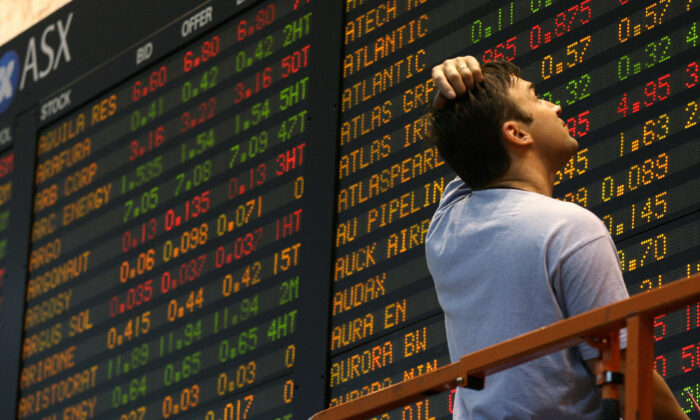Australia’s share market had its worst session in four weeks as reporting season finished, and as concerns emerged about the Aussie dollar.
The S&P/ASX200 benchmark index finished down 107.1 points, or 1.77 percent, to 5953.4 points on Sept. 1.
The first session after reporting season produced the steepest loss since the 2.04 percent drop on July 31.
The All Ordinaries index closed lower by 102.7 points, or 1.64 percent, to 6143.2.
The Reserve Bank, as expected, kept the cash rate at the record low of 0.25 percent and the yield on three year government bonds at 25 basis points.
The board decided to boost the bank’s term funding facility, which will allow banks and other institutions more funding during the coronavirus crisis.
They will be able to draw an equivalent of two percent of their outstanding credit, at a fixed rate of 25 basis points for three years, until the end of June.
GSFM investment strategist Steve Miller said the ASX got a bit of a fillip from the decision during the session, but believed bigger issues were at play in the loss.
“There is the question of the Aussie dollar. It may be weighing on the market,” he said.
The Australian dollar continued its upward trend and nudged above US$0.74 earlier before easing.
Miller said a high Aussie dollar could be a concern for big exporters such as miners.
He also believed U.S. markets, which were mostly lower overnight, could be due for tougher times. He cited uncertainty about the presidential election outcome and the U.S. Federal Reserve’s shift to a flexible inflation target.
“There is an expectation US markets will struggle from here … and I think these uncertainties are starting to weigh on global markets,” he said.
The ASX did not have the same weighting to tech giants, he warned, which have kept U.S. markets buoyant during the pandemic.
Meanwhile, there was better news from coronavirus-ravaged Victoria.
Premier Daniel Andrews confirmed he is preparing a plan to allow people and business more freedom in the state as virus infections drop. Five deaths and 70 infections were reported on Sept. 1.
Andrews will reveal the plan on Sept. 6. Melbourne residents remain under curfew and travel restrictions until Sept. 13.
On the ASX, there were losses of more than two percent for financials, energy, consumer staples and property.
Information technology had the biggest loss, 3.44 percent.
In banking, ANZ had a 2.79 percent decline to $17.77. Commonwealth Bank slipped 2.18 percent to $66.79, NAB lost 2.96 percent to $17.40 and Westpac shed 2.79 percent to $17.05.
Insurer QBE has lost its group CEO following an investigation into workplace communications.
Pat Regan is leaving after just three years in the job after the board said it had to take “decisive” action after receiving the external investigation report.
Shares finished down 6.31 percent to $9.94.
Temple & Webster boss Mark Coulter has netted more than $22 million for himself after he sold 2.4 million of his shares.
The sale comes the day after the furniture group’s full-year results prompted a record-high share price.
Coulter said the sale was partly due to his tax obligations. He retains more than 7.2 million shares.
T&W shares finished lower by 2.99 percent to $9.40.
Miners were mostly down. BHP lost 1.08 percent to $37.50, Rio Tinto shed 0.53 percent to $97.48 while Fortescue was up 1.15 percent to $17.62.
On Sept. 2, items of interest will include the June quarter national accounts, which are expected to confirm the nation’s first recession since the early 1990s.
Economists expect the economy contracted by about six percent.
In the U.S. earlier, the S&P 500 and Dow Jones finished lower as losses in financial, industrial and energy companies outweighed gains in technology stocks.
The Nasdaq finished higher.
Recent economic data has continued to stoke investor optimism in a recovery.
The Australian dollar continued its upward trend and was buying US$0.7391 at 1716 AEST, higher from US$0.7348 at the close on Aug. 31.
On the ASX
* The S&P/ASX200 benchmark index finished down 107.1 points, or 1.77 percent, to 5953.4 points on Sept. 1.
* The All Ordinaries index closed lower by 102.7 points, or 1.64 percent, to 6143.2.
* At 1716 AEST, the SPI200 futures index was trading up 9.0 points, or 0.15 percent, at 5,936 points.
Currency Snapshot
One Australian dollar buys:
* US$0.7391, from US$0.7354 US cents on Aug. 31
* 78.12 Japanese yen, from 77.71 yen
* 61.76 Euro cents, from 61.76 cents
* 55.16 British pence, from 55.15 pence
* 109.39 NZ cents, from 109.23 cents
By Steven Deare
Focus News: ASX Down in Worst Day in 4 Weeks
